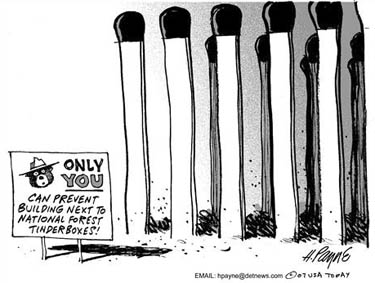Up in Smoke
“A problem that the Forest Service created—excess fuels—prevents appropriate burning, and so the problem grows. It is one of the great paradoxes of fire suppression that the more effective we are at fire suppression, the more fuels accumulate and the more intense the next fire will be.”
—USDA Forest Service quoted in Forest Policy Up In Smoke: Fire Suppression in the United States, Alison Berry 2007 (Available from PERC)
Insanity of subsidies:
“When your current approach is digging you into a hole, the sensible thing to do is not to dig faster. It is to stop digging.”
—Arnold Kling, economist, on how subsidies make things worse
(including those to corn-based ethanol)
The Nobel Prize in humility:
“There are so many people who could win. It’s like winning the lottery, actually.”
—Eric Maskin, 2007 co-winner of Nobel Prize in Economics
Kennedy the Friedmanite:
“In a true free market economy you can’t make yourself rich without enriching your community. What polluters do is they raise the standards of living for themselves, while lowering the quality of living for everybody else, and they do that by escaping the disciplines of the free market. You show me a polluter, I’ll show you subsidy.”
—Robert F. Kennedy, Jr. in 11/06 issue of The Progressive
Doing well by doing good:
“Every time I’ve done the right thing for the environment, I’ve made a profit.”
—Yvon Chouinard (founder of Patagonia)
From the messiah to the lab:
“Some people will do anything to save the earth … except take a science course.”
—P.J. O’Rourke, “Greenhouse Affect,” Rolling Stone
Recalibrate for polar bears?
“Even if we take the data at face value, we have lost 15 bears per year due to global warming, but 49 bears per year have been killed by hunting. So if we want to preserve the polar bear, the best thing we could do would not be to spend a trillion dollars to reduce the global temperature by a fraction of a degree by the end of the century, but to get the hunters to hunt something else elsewhere.”
—Bjorn Lomborg, author of Cool It: The Skeptical Environmentalist’s Guide to Global Warming
Conflict resolution:
“The key to solving the problem of conflict between livestock and grizzly bears is found in understanding the economics.… Markets and incentives can really be powerful engines for change.”
—Hank Fischer (6/25/07 speech)
Seldom is there a PERC:
“In America, alas, beauty has become something you drive to, and nature an either/or proposition—either you ruthlessly subjugate it, as at Tocks Dam and a million other places, or you deify it, treat it as something holy and remote, a thing apart, as along the Appalachian Trail. Seldom would it occur to anyone on either side that people and nature could coexist to their mutual benefit.”
—Bill Bryson, A Walk in the Woods: Rediscvoering America on the Appalachian Trail
Hot off the press:
“The commodity-based visions of the Old West and the amenity- based visions of the New West can intermix if the institutions that govern who controls how resources are used are determined by people who have a direct incentive to find win-win solutions to competing uses.…Only our imaginations limit the innovative institutional arrangements we can craft.”
—Accounting for Mother Nature:
Changing Demands for Her Bounty,
edited by Terry L. Anderson, Laura E. Huggins
and Thomas Michael Power
(available Dec. 17, Stanford University Press)



